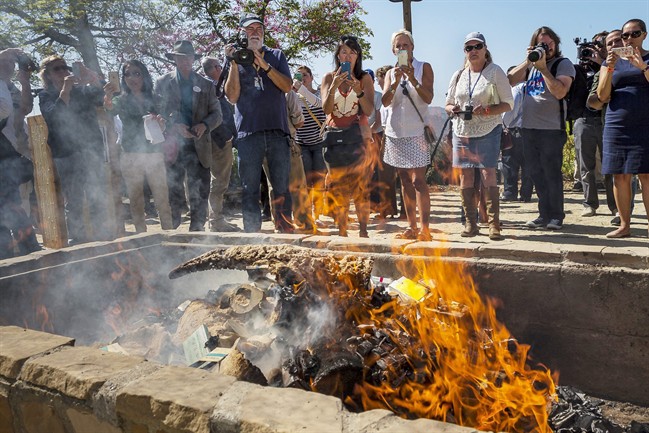SAN DIEGO – The San Diego Zoo burned items containing rhinoceros horn with an estimated black market value of $1 million in a symbolic gesture Thursday to show the U.S. is committed to ending illegal wildlife trafficking.

The U.S. Fish and Wildlife Service partnered with the zoo and California Department of Fish and Wildlife to hold the massive bonfire, the first of its kind in the United States.
Countries around the world have been burning and destroying illegal wildlife products to send the message that such products cannot be traded and that poaching of animals for their horns must stop. In April, 120 tons of elephant ivory and 1.3 tons of rhino horn were destroyed in Kenya.
WATCH: Kenya government burns 105 tons of ivory to protest poaching

The items — from carved horns to products falsely marketed as having medicinal qualities from the horns — were confiscated in the U.S. and outside the country, zoo spokeswoman Darla Davis said.
Officials say a rhino is poached every eight hours in Africa and they could become extinct in the wild in 15 years. In 2015, 1,175 rhinos were killed in South Africa alone, according to the San Diego zoo.
Gov. Jerry Brown recently signed a bill to close a loophole in the state’s ban on importing, buying or selling elephant ivory or rhino horns. Supporters said California is a major market for ivory, and the ban would help dry up demand.
The measure by Democratic Assembly Speaker Toni Atkins of San Diego aimed to end the state’s exemption for selling ivory imported before 1977. She said clamping down on the illegal ivory trade would help bring an end to the poaching of elephants and rhinos.
San Francisco and Los Angeles make up two of the country’s top three hubs for ivory sales. New York, which wildlife officials call the country’s biggest ivory market, banned the sale of most elephant ivory, mammoth tusks and rhinoceros horns last year.
WATCH: African elephant populations down 30 per cent according to new census




Comments